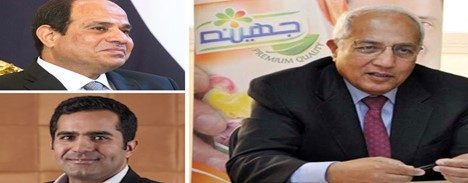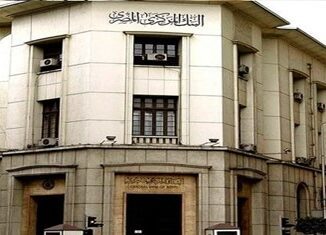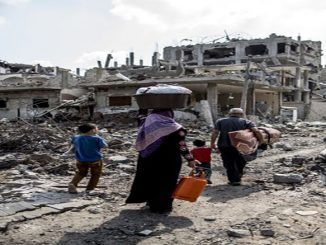
Mariam Safwan Thabet, daughter of tycoon businessman Safwan Thabet, has highlighted his difficult prison conditions in a tweet she posted on Twitter on Tuesday
Mariam expressed concerns over the health of her 75-year-old father in Sisi’s prisons, for resisting security agency demands.
Safwan Thabet, the founder, former CEO and majority shareholder of Egypt’s largest dairy products and juice producer Juhayna, are growing given that he has been held in prolonged solitary confinement since his arbitrary arrest in early December 2020.
Mariam, the daughter of the jailed Egyptian businessman, Safwan Thabet, on Tuesday, posted a tweet on her Twitter account, saying: “Imprisoned in a solitary cell. He is not allowed to leave his cell except for court hearings and family visits only!”

Mariam Thabet continues, saying: “He is not allowed exercise! Even for minutes a day!
He only sees his jailer once a day when he brings him his food!
No chair for him!
Books forbidden!
Sleeps on the floor!
Diary of one of the pillars of Egypt’s economy, he and his only son!
Safwan and Seif!
Everyone is alone in his own prison cell. “
According to an Amnesty International report, Egyptian authorities abused counter-terrorism laws in arbitrarily detaining the leading businessman and his son in conditions that amount to torture in reprisal for their refusal to hand over company assets.
Concerns over Thabet’s health are growing given that he has been held in prolonged solitary confinement since his arbitrary arrest in early December 2020.
His 40-year-old son, Seif was arrested two months later, in February 2021, and has also been held in solitary confinement in conditions that amount to torture. Prior to their arrests, Egyptian security officials had demanded they relinquish control of Juhayna’s assets.
“Safwan and Seif Thabet are being punished simply for daring to defy demands by Egyptian security officials to hand over their family’s assets in the company Juhayna, which is a household name in Egypt. They have shown rare courage in resisting the officials’ attempt to blackmail them. We urge the Egyptian authorities to release the two men, who should never have been arrested in the first place,” said Philip Luther, Amnesty International’s Middle East and North Africa Research and Advocacy Director.
“In addition to being denied the right to challenge the lawfulness of their detention, Safwan and Seif Thabet are being tortured by being held in prolonged and indefinite solitary confinement. The Egyptian authorities have a long history of using bogus counter-terrorism charges and accusations to crack down on political dissent; now they are using the same tactic to target businesspeople who refuse to comply with their arbitrary seizure orders.”
Amnesty International spoke to three people familiar with Juhayna and Thabet’s family situation and reviewed court documents, media articles and official statements relating to the men’s arrest and detention.
In the early hours of 2 December 2020, around 50 armed policemen in four armoured vehicles led by an officer with the National Security Agency- a specialized police force with a mandate to police terrorism and security threats- broke into Safwan Thabet’s home in Cairo and arrested him.
For four days, security forces denied having him in custody, until he was taken to the Supreme State Security Prosecution (SSSP). Prosecutors told him he was being accused of joining and financing a terrorist group on the basis of a secret report with the NSA that neither Safwan nor his lawyer were allowed to examine. No evidence of their involvement in a recognizable crime was presented; the NSA secret report was the sole basis for their detention order.
Egyptian state media reported that Safwan Thabet was arrested on allegations of financing the Muslim Brotherhood, which Egyptian authorities, but authorities have failed to provide any evidence to support their claim regarding this alleged affiliation, which independent experts deny.
According to a source familiar with Juhayna operations, shortly before his arrest, a senior Egyptian official had asked Safwan to hand over part of his company to a government-owned entity.
On 31 January 2021, two months after his father’s arrest, Seif Thabet was ordered to report to the NSA. Seif was not allowed to bring a lawyer to the meeting, during which a security official ordered him to hand over the entirety of his family’s shares in Juhayna or face a similar fate to his father. The Thabet family continued to refuse to sign over their assets.
On 2 February 2021, Seif Thabet returned to the NSA offices as instructed, and did not re-emerge. Instead, security forces took him to the SSSP on 6 February, where a prosecutor told him that he was accused of joining and financing a terrorist group, again on the basis of secret NSA investigations that he was not allowed to examine. The authorities refused to reveal his whereabouts, until his family finally managed to locate him inside the notorious al-Aqrab (Scorpion) prison, part of the Tora Prison Complex, on 14 February.
SSSP prosecutors and later judges in terrorism circuits of criminal courts have repeatedly extended their detention pending investigations. Prosecutors have even extended their detention in their and their lawyers’ absence, and without allowing them at any point to challenge the legality of their detention.
Safwan Thabet suffers from stomach ulcers, high cholesterol, fatty liver, double knee replacement, shoulder injuries. He has been held in a solitary cell at Mazra’at Tora Annex Prison, part of the Tora Prison Complex, since his arrest, and the prison administration has refused to regularly deliver food, medicine or clothes. These cruel conditions, coupled with the denial of medical treatment, have exacerbated concerns over his health.
According to an informed source, Seif Thabet has been held in prolonged solitary confinement in an insect-infested cell, denied access to a bathroom or shower and deprived of adequate food and water. His family has been denied regular visitation rights and has only rarely been allowed to see him. He sleeps on blankets on the floor and is banned from having any personal items or climate-appropriate clothing.
Amnesty International considers that the treatment by the prison authorities amounts to torture and other ill-treatment and violates Egypt’s obligations under international law. In addition to being subjected to prolonged and indefinite solitary confinement for months, they are detained in inhumane conditions, provided with insufficient food and denied access to medication and treatment as well as regular family visits.
Pending their release, Amnesty called on the Egyptian authorities to ensure that the two men are removed from solitary confinement and allowed access to adequate medical care, regular family and lawyer visits, and access to adequate food, water and sanitation.
In January 2017, a court added Safwan Thabet and 1,500 others to the “terrorists list” without any due process. Although the Court of Cassation struck down that designation in July 2018, another court re-added Safwan Thabet to the list in April 2018, a decision which was upheld by the Court of Cassation in March 2021. As a result he is subject to a travel ban and asset freeze.
A source familiar with Juhayna’s operations told Amnesty International that policemen stationed next to some of the company’s facilities routinely stop drivers, seize their cars or licenses and sometimes briefly detain them, especially ahead of major distribution seasons including in April 2021. Egyptian and international media outlets reported in May 2021 that the Juhayna company had filed an official complaint about disruptions to its operations.
In 2020, Egypt’s Abdel Fattah al-Sisi publicly instructed officials to expand Egypt’s dairy collection capacity. Throughout 2021, Egyptian pro-government media have published articles calling for the state acquisition of Juhayna, and accusing Safwan and Seif Thabet of terrorism.
“The attack on Juhayna shows just how far the Egyptian authorities are willing to go to exert control and exposes how terrorism related accusations are ruthlessly exploited in today’s Egypt, with total disregard to the impact of these measures on the lives and livelihoods of affected people,” said Philip Luther.



